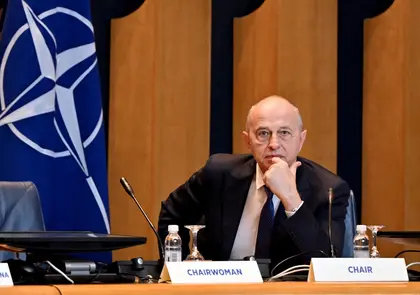Russian disinformation and cyberattacks could be expected during this year’s elections across Europe, said NATO Deputy Secretary General Mircea Geoană in an interview with Romanian news outlet Digi24.
Geoană, a native of Romania, said his country would likely be one of Moscow’s targets, and the latter would likely support those with an anti-Western stance, though they might not be necessarily pro-Russian.
JOIN US ON TELEGRAM
Follow our coverage of the war on the @Kyivpost_official.
“It's an obviously anti-Western force that Russia and others are trying to do here, to encourage those who are not necessarily pro-Russian, but are anti-Western – and there is a line of deliberate confusion in that area,” said Geoană.
He added the fact that 56 percent of Romanians do not believe the upcoming elections will be free and fair – as per recent polls – remains a point of concern.
Geoană said the ongoing situation in neighboring Moldova could be illustrative of Russia’s hybrid operations.
“There is now a much broader definition of national security and allied security. There is a military one, obviously. There is also a dimension of economic security, of cyber security, of security in front of hybrid theaters.
“Look at what is happening in the Republic of Moldova and here,” said Geoană.
In March, Moldovan Minister of Internal Affairs Adrian Efros said Chișinău is in a “state of full-scale hybrid war” with Moscow where the Kremlin has been attempting to interfere in its internal affairs, as reported by RBC Ukraine.

Europe Should Be Afraid if Putin Accepts US-Proposed Peace Plan
While Geoană refrained from making “evaluative judgments” on Romanian politics, he voiced his hopes that Romanians would “come to vote in large numbers to protect their vote and not to let the future president of this country be appointed by the political oligarchy.”
Romanian presidential elections are scheduled for Sept. 15, while its parliamentary elections are scheduled for Dec. 8. The country is also building one of Europe’s largest NATO bases, which will be the size of a small city once completed, as reported by Kyiv Post in March.
The elections to the European Parliament will take place between June 6-9, where nationals of all member states are expected to cast their ballots to elect those representing their states.
Presidential elections for Slovakia, Lithuania, Iceland and Moldova are due to take place this year. Iceland is not an EU member state but a member of the European Economic Area (EEA), which is part of Europe’s single market.
There are also nine parliamentary elections in Europe this year, of which four are “likely to result in a notable change in government and/or policy direction,” as per a November 2023 report from EIU.
You can also highlight the text and press Ctrl + Enter






